13 Jun 16 | About Index, Bahrain, Bahrain Statements, Campaigns, Campaigns -- Featured, Statements
Index on Censorship condemns the arrest on Monday 13 June of human rights campaigner Nabeel Rajab in Bahrain. According to reports Rajab was charged on Tuesday 14 June with “publishing and broadcasting false news that undermines the prestige of the state” and detained for seven days.
Rajab, a former Freedom of Expression Award winner and a judge on this year’s awards, is one of the Gulf region’s most well-known human rights activists. Since the Bahraini uprising of 2011, he has been arrested on numerous occasions: he spent two years in jail between 2012 and 2014, and was arrested just months after his 2014 release for tweets in which he called Bahraini institutions “ideological incubators” for ISIS.
Rajab, president of the award-winning Bahrain Center for Human Rights (BCHR), and a member of the advisory committee of the Human Rights Watch Middle East division, spent three months in jail for the tweets. He was rearrested on Monday, according to the Bahrain Institute for Rights and Democracy. The reasons for the arrest were unclear.
“The harassment of Nabeel Rajab must stop. We call on the international community – and especially Bahrain’s close ally, the United Kingdom – to condemn this ongoing attempt to silence one of the region’s most highly respected human rights campaigners,” said Index chief executive Jodie Ginsberg.
Bahraini authorities have repeatedly targeted Rajab as well as other human rights campaigners and political activists. Last week, Zainab Al-Khawaja was forced into exile in Denmark. Abdulhadi Al-Khawaja, her father, is serving a life sentence for his calls for democracy in Bahraini society. Her sister, Maryam Al-Khawaja, has also been harassed by the authorities and has been exiled to Denmark.
Related: Bahrain continues to use arbitrary detention as a weapon to silence critics
10 Jun 16 | Greece, Mapping Media Freedom, mobile, News and features, Serbia, Spain, Turkey, Ukraine
Click on the dots for more information on the incidents.
Each week, Index on Censorship’s Mapping Media Freedom project verifies threats, violations and limitations faced by the media throughout the European Union and neighbouring countries. Here are five recent reports that give us cause for concern.
On 1 June David Jiménez, who was fired as El Mundo’s director on 25 May, filed a complaint against the paper.
Jiménez alleges that Antonio Fernández-Galiano Campos, president of El Mundo’s owner Unidad Editorial, pressured him to edit the paper to conform with the publisher’s corporate strategy.
Jiménez, who was hired as director in May 2015, claimed his right to direct editorial coverage independently was suppressed. His firing came just four days after the paper laid off 168 staffers including 38 journalists due to financial pressures.
Riot police overseeing an operation to move refugees from a camp in Idomeni, on the border near Macedonia (FYROM), only allowed public broadcaster ERT and the national Athens News Agency to cover the events.
The Greek Union of Photojournalists denounced the “flagrant violation of the freedom and pluralism of press”, during an operation to evacuate the country’s largest informal refugee camp of Idomeni. The statement stressed that journalists and photojournalists were not in danger, at least “not more than the ERT and ANA journalists”.
“If the trapped people use violence it won’t be against journalists and photojournalists, but against the police,” the organisation said in its statement.
In an interview with Greek TV, Mega Channel, a representative of the government commented that “there are always restrictions to the press during such operations”.
Journalists for the provincial radio and TV station RTV Vojvodina claim they will be replaced by new journalists who have been chosen by the Serbian Progressive Party, which has been the ruling party in the autonomous region Vojvodina since the elections in April 2016.
The entire editorial staff was told on Wednesday 18 May 2016 that they no longer need to come to work, and that other journalists would take over their jobs. They have not been fired.
Editor-in-chief of TV channel 1, Mirjana Jovic, and general director Srdjan Mihajlovic had earlier resigned. Both are believed to have left the station under “political pressure”. Programme director Slobodan Arezina has also been dismissed, B92 reported.
In response, around forty journalists and editors have sent an open letter in which they express their worries about “sudden personnel changes that have not been clearly explained”. They are demanding a public explanation from the management “about why there has been such a sudden shift without explanation and whether this is a political decision”.
A court in the city of Mersin sentenced journalist Arzu Yildiz to 20 months in jail and deprived of legal guardianship over her children for footage she published in May 2015.
The footage was from a court hearing where four prosecutors were on trial for ordering a search of trucks belonging to Turkey’s MIT intelligence agency as they traveled to Syria in 2014, Reuters reported. President Erdogan accused those who covered the story as plotting against his government along with enemies to undermine Turkey and to embarrass the country.
The lawyer said the decision to strip parental rights was an act of revenge. “There are many cases in which the court does not execute this article of the penal code. They didn’t have to do it”.
Ukrainian president Petro Poroshenko signed a decree to impose personal sanctions against 17 Russian media executives for broadcasting propaganda, the Unian information agency reported.
According to Human Rights Watch, among the 17 are Konstantin Ernst, general director of Channel One, Russia’s main state-owned television channel, and Margarita Simonyan, chief editor of Russia’s international television network RT (formerly Russia Today) and the Rossiya Segodnya news agency. Journalists on the list also include Vladislav Fronin, chief editor of the official government newspaper Rossiyskaya Gazeta, and Vitali Leibin, editor at Russkiy Reporter magazine. Russia either owns — at least partially — or exerts significant control over the media outlets listed in the presidential decree, HRW said.
According to the decree the 17 individuals “create real and potential threat to national interests, national security, sovereignty, and territorial integrity of Ukraine; facilitate terrorist activity and violate citizens’ rights and freedoms; contribute to the occupation of territories, and obstruct full realization of rights and freedoms by Ukrainian citizens.”
The decree bars the 17 from entering Ukraine through December 31 2017.
09 Jun 16 | Americas, Colombia, mobile, News and features
 Art has traditionally accompanied political and social movements in Latin America and the turn of the 21st century has seen a resurgence of diverse forms of expression, including hip hop.
Art has traditionally accompanied political and social movements in Latin America and the turn of the 21st century has seen a resurgence of diverse forms of expression, including hip hop.
“Hip hop has many faces — from the underground scenes to gangster rap — and it allows you to talk about many different things,” says Colombian rapper Luisa Ospina, aka Shhorai. “Many artists may talk about ‘bitches’, drugs and violence, and that’s fine for them, but it’s not for me, especially given the history of violence and conflict in my country.”
Shhorai, an independent hip-hop artist, educator and activist from Colombia’s second-largest city, Medellín, began rapping in 2003 at the age of 13.
“I started recording music at my home studio at 15, influenced by my older brother who is also a rapper,” Shhorai says. She released her debut album Verdades Hostiles in 2011, followed by Doble X: Inicio y Complemento in 2015. She has worked in collaboration with various Colombian artists, including Nkanto MC and Koriotto.
Taking inspiration from female MCs throughout the Americas – from Columbian duo Diana Avella and Lucía Vargas and Venezuala’s Gabylonia to Queen Latifah, famed for fighting misogyny in US hip hop – Shhorai uses her music to explore the structures of gender and class which create disadvantages for so many Colombians. Despite the progress her country has made in the last few decades, many problems remain unresolved. “Women in particular in my country have poor access to decent jobs and education and too many sisters have been affected by violence,” Shhorai said.
“For indigenous women and women who work on the land, it is even worse: they work so hard but are still silent. Can you imagine a society in which so many women have no voice?”
“I was born in a culture which is all the time asking women: ‘Why don’t you wear makeup?’ ‘Why are you so big?’ ‘Why do you eat this?’,” she says. “So I rap a lot about empowering women and becoming more independent because often we don’t trust ourselves or know the inner power we have.”
For every 10 men in hip hop, there is only one woman, explains Shhorai. “So we are naturally at a disadvantage and often feel alone, so we have to work together,” she says. “And while I love feminism, I don’t like hate for men because I recognise that we are together and must fight together.”
Many women — as with many men — in hip hop, come from poor communities, not just in Medellín, but in Colombia’s capital Bogota and other cities like Cali.
There are many sides to Medellín. Foreigners may know it for its troubled history — Pablo Escobar, cocaine and the violence that accompanied them. Other visitors may be more aware of its current status as one of the foremost and growing art and cultural hubs on the planet. The city came out on top of Tel Aviv and New York and was named the world’s most innovative city in 2013.
“Medellín has become a much better city than it was 20 years ago — with many restaurants, a metro system, concerts all the time — but many still don’t see how hard it still is for many people who live here – those who don’t have the resources to go to university, or for the young people who have to fight against a system just to own something,” Shhorai explains. “The city has two very different faces.”
Poor communities and minorities like indigenous people “don’t have options” and often don’t have a say. “I want the world to pay more attention to the poverty because the rich downtown doesn’t need more publicity — it has enough,” Shhorai says.
This is what the rapper aims for in much of her work — whether in music, education or activism — when she talks about the political background and social conditions in her neighbourhood. “In this way, hip hop is for me a kind of liberty and at the same time an expression of love for my community.”
One of the big problems in Colombian society is how in many ways it has turned a blind eye to the problems faced by women and the poor alike. A byproduct of this, inevitably, is marginalised people turning to hip hop and hip-hop culture — from breakdancing, DJing, MCing and graffiti — as places where they can finally be heard.
“Hip hop was born in poor communities in the USA often by those living terrible conditions and I can see they discovered a way of getting together and doing something as a community,” says Shhorai. “This idea filtered back to us in Latin America and we got into hip hop for many of those same reasons, which is why rap music is everywhere in Medellín.”
“But above all, hip hop is an opportunity to be independent, and while it’s difficult, it is possible to create real change through art.”
Also read:
– Zambezi News: Satire leaves “a lot of ruffled feathers in its wake”
– Jason Nichols: Debunking “old tropes” through hip hop
– Poetic Pilgrimage: Hip hop has the capacity to “galvanise the masses”
8-9 July: The power of hip hop
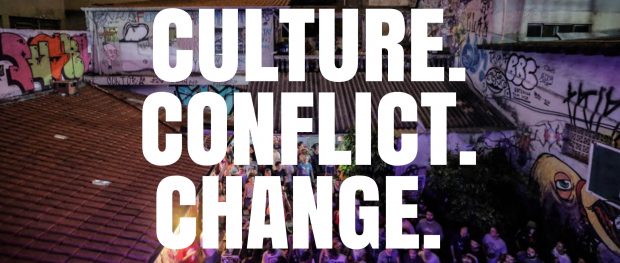
A conference followed by a day of performance to consider hip hop’s role in revolutionary social, political and economic movements across the world.
08 Jun 16 | News and features, Turkey, Turkey Uncensored
Nothing could illustrate the course of developments in Turkey better than the case of prosecutor Murat Aydın.
In what was described as a “judicial coup” in critical media, Aydin was one of 3,746 judges and prosecutors, who were reassigned in recent days, an unprecedented move that has shaken the basis of the justice system. Some were demoted by being sent into internal “exile”, some were promoted.
According to daily Cumhuriyet, his pro-freedom stance landed him in the former group.
Aydin’s transgression was to challenge the Turkish Penal Code’s Article 299 — the basis of “insulting the president” cases — in the country’s constitutional court. He argued that Article 299 was unconstitutional and conflicted with the European Convention on Human Rights. He had asked the top court to void the article.
After the reshuffle, he was told he would now be handling cases in Trabzon on the Black Sea coast, clear across the country from İzmir on the Aegean, where he had been working.
“I was exiled because of the decisions I have made and my expressed views,” he told Cumhuriyet. ”The worst part is, there is no authority any longer where we seek these type of sanctions to be checked, where we can challenge unjust acts.”
Meanwhile, another prosecutor, Cevat İslek, who made his name filing charges against journalists on the basis of “insulting the president” was promoted, Cumhuriyet noted, to the position as the deputy chief prosecutor in Ankara.
One wonders how such transfers are perceived by the public. Do Turks notice that the how the president, Recep Tayyip Erdoğan, and his AKP government are seizing control over the domain of expression through the imposition of large-scale punitive measures? Do they notice that this is taking place in defiance of the constitution, which defines the office of the president as being “impartial”?
The accelerated authoritarianism in Turkey — chiefly targeting media, academia and civil dissent — leaves nothing to chance. Though the media sector and its professionals remain top of the list for the president’s persecution, those who are seen as instrumental in filing and judging the court cases against them are also targets.
The issue has raised the alarm levels to new heights. In a recent report a global body of legal experts issued an “orange level” of concern on the state of the judiciary in Turkey, warning, after scrutinising the rising problems, that it is falling into total subordination of the executive.
”The ICJ remains concerned that transfers are being applied as a hidden form of disciplinary sanction and as a means to marginalize judges and prosecutors seen as unsupportive of government interests or objectives,” the Geneva-based International Commission of Jurists (ICJ) wrote in its report, Turkey: the Judicial System in Peril, which was prepared after a long series of talks with anonymous judges and prosecutors, among others.
“Many of those with whom the mission met noted that there are now unprecedented levels of pressure, division, distrust and fear in the Turkish judiciary. There are alarming signs that this has already led to manipulation of the judicial system on political grounds, including to target government opponents or to criminalize and prosecute criticism of the government. Of particular concern, is the high number of prosecutions for offences restricting freedom of expression, in particular for the offence of ‘insulting the president’.”
With the backbone of justice highly infected by partisanship, a “total eclipse” is looming and it becomes much easier to grasp the magnitude of oppression. “Insulting” cases may have risen above 2,000 since last year, but what is happening today is a multifaceted assault on freedom of speech and journalism as a whole.
Media monitoring organisations – Platform for Independent Journalism, Reporters Without Borders and Turkish Trade Union of Journalists – estimate that, now, the portion of media under direct and/or indirect control of the presidential palace and the AKP, is around 90%. This is corroborated by Mapping Media Freedom, which has recorded the litany of cuts against journalism.
The remnant segment of independent journalism operates, under great legal and financial strain, with dailies such as secular Cumhuriyet, liberal Özgür Düşünce, leftist Birgün and Evrensel, and Kurdish Özgür Gündem. On the TV side, the “capture” is even more severe: there are only three channels — Kurdish IMC TV, liberal CanErzincan and secular Halk TV — airing critical content.
But even such a weakened media segment seems to worry the authorities. The most recent meeting of the National Security Council, a powerful body symbolising state authority, ended with the endorsement that the battle against what the AKP sees as the “domestic enemies”, namely the Kurdish Political Movement and what Erdoğan depicts as “parallel structure” Gülenists, will be escalated.
Everybody knows what this refreshed announcement means: the remaining independent outlets will be criminalised by any means necessary. The latest developments indicate that the special office of prosecution on crimes against the constitution is preparing to launch inquiries against a number of outlets, chiefly targeting the Kurdish media. In other words, further closures may be expected to appear on the government’s agenda.
Along with the systematic arrests of more than 12 reporters of Dicle News Agency, which is almost the only source of news on what takes place during “scorched earth” operations in the mainly Kurdish southeastern provinces, the strongest sign on the media clampdown is the legal investigation filed against more than 15 well-known journalists — most of them non-Kurdish — who took part in an act of solidarity, “Chief Editors Vigil”, with the pro-Kurdish daily, Özgür Gündem.
The journalists are expected to be charged with “terrorist propaganda” under Turkey’s anti-terror law, which Erdoğan and the AKP government refuses to revise despite EU demands – a key criteria for visa liberalisation for Turkish citizens.
Nothing, it seems, will suffice to alter the authoritarian course Turkey has been taking and the price journalists and peaceful dissidents are forced to pay rises geometrically.
But nothing seems to stop the tiny-but-tough core of resistant journalists who continue to confront the Orwellian state as it consolidates itself under the nose of the pro-government and subservient media.

Turkey Uncensored is an Index on Censorship project to publish a series of articles from censored Turkish writers, artists and translators.
06 Jun 16 | Croatia, Europe and Central Asia, European Union, Hungary, News and features
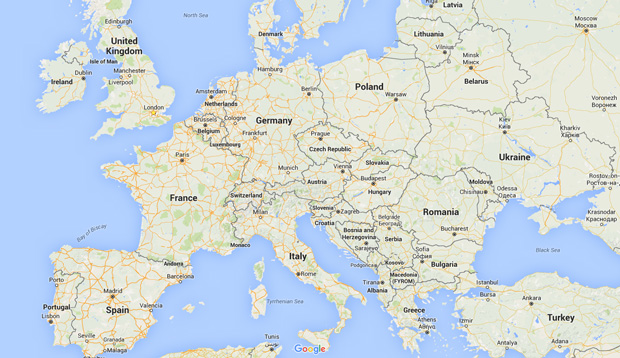
Since the 1920s, generations of western Europeans got used to the monopoly of public radio and later public television. These broadcasters developed strategies to better serve audiences and distance themselves from governments. The arrival of private broadcasters, in many cases taking place only in the 1970’s, was generally viewed as a complimentary service aimed at entertaining the public. Although public service broadcasting lost market share, it remained a respected institution in society; necessary to bring up youth, to get an objective picture of the world and cater to the interests of minorities.
Eastern Europeans also got used to the monopoly of state radio and television. Those broadcasters served the communist parties and were administered and financed by governments. Their political bankruptcy came with the collapse of communist ideology, underlined in particular by the plurality of private broadcasters that came on to the scene in the early 1990s.
These private media – with plentiful Western programming – was indeed television, for so long hidden from the viewers by totalitarian regimes. Politicians flocked to their studios to take part in talk shows, abandoning once-mighty state television. Thus, in the east, the public perception of public broadcasting was predominantly sceptical, if not negative. A discussion on its development was of tangential interest, at least during the saturation process of the new private media.
Abandoned by politicians and the public, the slow and clumsy transformation of the state broadcasters into public ones was guided by the bureaucrats, almost by themselves. The driving force behind the transformation was almost exclusively the activity of Strasbourg and Brussels. We all know that in the words of European institutions “public service broadcasting is a vital element of democracy in Europe.” Transformation of state television into a public one was a condition precedent of new democracies becoming member states of the Council of Europe in some cases. The authenticity of the transformation has been important to become a candidate for entry into the European Union and even sometimes to NATO.
Developments in younger EU member states show the importance of public service broadcasters for the development of democracy – and how they can be misused.
In December 2015, Poland‘s parliament adopted a law giving the treasury minister the mandate to appoint and dismiss members of management and supervisory boards. Since the law came into effect in January, reportedly more than 100 journalists in public media have lost their jobs, allegedly for not being government-friendly.
In March, the Croatian parliament dismissed the director general of Croatian Radio-Television. A week later, the government also proposed that parliament reject a regular report from the independent media regulator, both events raising serious concerns about the overall media freedom situation in the country.
Hungary was probably the first example in the EU where public service broadcasting was practically turned back into state broadcasting, going against international standards calling for independence. New media laws in 2010 and the restructuring of the media landscape led, within a matter of one year, to all public service media being subordinated to political decisions. The new system introduced and cemented the political dependence of public service media; the governing party had nominated all new heads of public service media and the Media Authority now controls the budget of all public service media. The law vested unusually broad powers in the politically homogeneous Media Authority and Media Council, enabling them to control content of all media.
The battle to establish credible public service broadcasters in transitional democracies has been even more difficult to wage.
The latest example is the steering board of Bosnian Radio and Television which last month decided to suspend operation of all programming at the end of this month. This decision, a wrong one for several reasons, follows years of political and financial wrangling over control of the operation.
Throughout the western Balkans, significant issues are pending affecting the independence and financial stability of public broadcasting.
A bureaucratic response to the need to establish public service broadcasters has brought predictable results. The newly established broadcasters were visibly underfunded, with formal and informal administrative links – if not strings – to governments and no clear commitments to the public. Once established, it was unclear what to do with them. Most governments viewed them as an element of bureaucracy itself, a burden to carry on the road to a united Europe. If possible and convenient, they tried to make use of them through a carrot-and-stick policy.
As such, the new public service broadcasters immediately became subject to criticism by almost anyone who wanted to speak about them. Left to survive in the monstrous buildings of brutal architecture that once belonged to powerful state television, they had to sell airtime to advertisers, beg for Western donations and save on everything.
The advance of the internet and other new technologies almost killed the whole idea of television and radio, including public service broadcasting. It was saved by the transformation process – from public service broadcasting to public service media. In the West, the BBC and other companies have struggled to make use of the changing trends in media consumption. They went online, launched smartphone applications, became interactive, archived in order to engage fragmented audiences where and when required by the viewers.
Unfortunately this is not the case in the East. Public service broadcasters at best try to appeal to the older and well-educated audiences, traditional in their use of public service media. For our children, today’s debate is not only irrelevant, it is beyond their understanding.
Is there a future?
In my view we are losing the battle and might soon lose the war. To reverse the trend, we should do the following:
Give public service broadcasters a clear-cut mandate and obligation to program for the public which, in turn, should have effective feedback and control over content. There should be programmes that cater to minorities; there should be objective news, calm and matter-of-fact debates, educational and children’s programmes.
Public service broadcasters should function independently of the government. Buffer boards, meaning councils should be established to guarantee that only an abuse of a clear-cut mandate may serve to reprimand or dismiss an editor; only mismanagement and corruption may lead to firing executive directors.
And, finally, licence fees should be introduced or increased to heighten a feeling of public ownership. We can talk about other methods of independent funding, but none of them may bring this feeling of owning an institution that serves you.
Recent columns:
Dunja Mijatović: Chronicling infringements on internet freedom is a necessary task
Dunja Mijatović: Propaganda is ugly scar on face of modern journalism
Dunja Mijatović: There is hope that justice can be served in Serbia
06 Jun 16 | Events, mobile
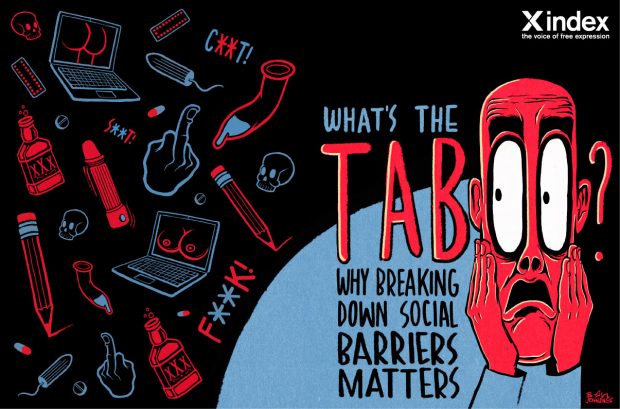
Join Index on Censorship for a fast and furious quiz exploring what you can and can’t say in today’s society.
Watch our panelists struggle to evade the censor, cast your own vote on where to draw the line, and expect plenty of no-go subjects to come out from the shadows.
Featuring Guardian and Index on Censorship cartoonist Martin Rowson, comedian Athena Kugblenu, theatre-maker Nadia Latif, director of Homegrown, and journalist Ian Dunt of politics.co.uk and Erotic Review.
When: 6 Aug 2016, 2.10pm
Where: The Forum, Wilderness, Oxfordshire
Tickets: From the Wilderness site
Wilderness takes place on 4 – 7 August 2016, at Cornbury Park set in Oxfordshire.
03 Jun 16 | Africa, Americas, Burkina Faso, Colombia, Europe and Central Asia, Events, Germany, mobile, Nigeria, South Africa, Uganda, United Kingdom, United States, Zimbabwe

Since its birth in the Bronx in the 1970s, hip hop has made its mark. Today, graffiti artists, MCs, breakdancers and DJs across the world are still using the medium to empower themselves, from women in Columbia and political movements in Burkina Faso, to aiding the fight for free speech in Zimbabwe and challenging religious stereotypes in the UK.
Index on Censorship has teamed up with In Place of War to create two unique full-day events that provide an opportunity to listen to, learn from and collaborate with 14 world-changing hip hop artists from eight different countries.

The Power of Hip Hop: Exchange / 8 July
A multi-disciplinary full-day academic conference that considers hip-hop’s role in revolutionary social, political and economic movements across the world.
The Power of Hip Hop: Exchange will explore the role, challenges and potential of hip-hop culture in facilitating positive social change in global contexts, and its role as a site of resistance and identity.
The day features academic panels, keynote papers, artist performances and practitioner presentations. This event harnesses In Place of War’s vast international network of grassroots artists and University of Manchester origins, to explore issues including hip hop and gender, race, religion, commerce, and conflict.
When: 8 July 2016, 10.00 – 18.30 (registration 9.30)
Where: Richmix, London (map)
Tickets: £45/£36 concessions – lunch, refreshments and delegate packs included (buy online)
Promo Code: “hiphop15” (£15 ticket). Can be redeemed online at checkout, over the phone or at the box office.

The Power of Hip Hop: Live / 9 July
A day of TED-style talks and live performance. Join 14 of hip hop’s most revolutionary artists from across the world for a mix of music, dance, rap, DJing, VJing, exhibitions and satire.
From local grassroots initiatives to multi-national citizen movements, you’ll hear stories of how hip hop is changing the world first-hand. You’ll encounter the artists performing live. And you’ll have chances to meet the speakers throughout the day, before a DJ set and drinks to end it.
Featuring Index on Censorship’s inaugural Music in Exile fellow Smockey (Burkina Faso), Rodney P (UK), Zambezi News (Zimbabwe), Wade Waters (USA), Poetic Pilgrimage (UK), SYMBIZ (Germany), Shhorai (Colombia), Afrikan Boy (UK/Nigeria) and more.
When: 9 July 2016, 12.00 – 19.30 (doors 11.30)
Where: Richmix, London (map)
Tickets: £20/£15 concessions (buy online)
Promo Code: “hiphop10” (£10 ticket). Can be redeemed online at checkout, over the phone or at the box office.

03 Jun 16 | Bahrain, Middle East and North Africa, mobile, News and features
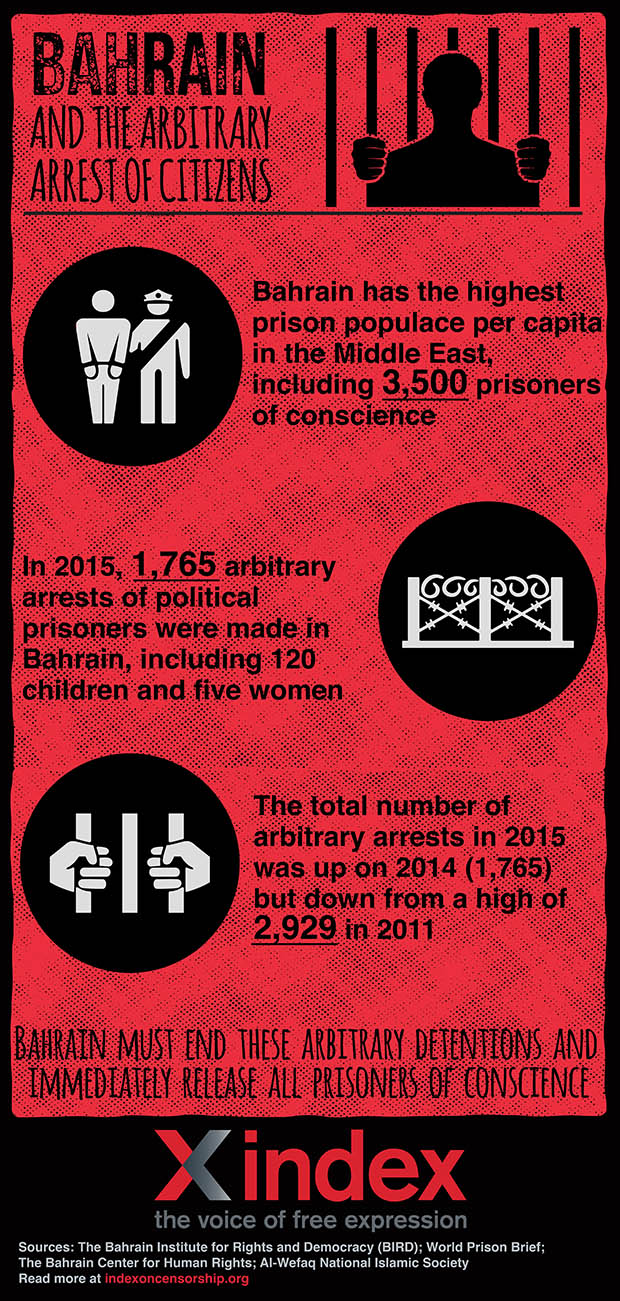
Bahraini authorities this week released opposition activist Zainab Al-Khawaja, who had been imprisoned with her infant son since March. She had been convicted of insulting the Bahraini king after she ripped up a picture of him.
Al-Khawaja may now be out of prison — though she could be re-arrested at any time — but her father, Abdulhadi Al-Khawaja, is one of over 3,500 prisoners of conscience who remain in Bahrain’s jails. According to research by World Prison Brief, Bahrain has the highest number of prisoners per capita in the Middle East, with 301 people in jail per 100,000 people of its 1.3 million population (followed by Israel at 256).
Arbitrary detention is the imprisonment of a person without proper evidence that they committed a crime or a case in which there has been no proper due process. Last year, the Liberties and Human Rights Department (LHRD) of Al-Wefaq National Islamic Society recorded a total of 1,765 arrests by security services for reasons related to the opposition political movement, including the arrests of 120 children and five women.
The total number of arbitrary arrests last year was up on 2014 (1,765) but down on 2013 (2,192), 2012 (2,221) and 2011 (2,929).
The UN Working Group on Arbitrary Detention, a UN body consisting of five experts, has repeatedly concluded that Bahrain has violated several international standards of a fair trial. In September of last year, the group found the detention of the secretary general of Al-Wefaq National Islamic Society, Sheikh Ali Al-Salman — this month sentenced to nine years imprisonment — to be arbitrary and “falls under category II and III of the Working Group’s categories of arbitrary detention”.
The five categories of arbitrary deprivation of liberty, according to the UN group are: when it is clearly impossible to invoke any legal basis justifying the deprivation of liberty (I); when the deprivation of liberty results from the exercise of the rights or freedoms (II); when the total or partial non-observance of the international norms (III); when asylum seekers, immigrants or refugees are subjected to prolonged administrative custody without the possibility of administrative or judicial review or remedy (VI); and when the deprivation of liberty constitutes a violation of international laws for reasons of discrimination (V).
In 2013, the UN Working Group on Arbitrary Detention found the imprisonment of Index on Censorship’s Freedom of Expression Awards 2016 judge Nabeel Rajab (since pardoned) to be arbitrary, and, along with Index, called for his release.
Last year’s arbitrary arrests of prisoners of conscience in Bahrain included Mohammed Mahdi Alekri, a member of Al-Wefaq’s advisory board who was arrested on 4 January 2015 by security forces during a demonstration against the arrest of Al-Salman.
Also among those arrested was Sayed Sa’eed Isa, a member of The Martyrs Associate and father to Sayed Hashim Saeed, the 15-year-old boy killed during the security crackdown on demonstrations in Sitra late 2011.
The Bahraini authorities have continued to use arbitrary detention to silence political opponents and opposition supporters.
02 Jun 16 | Magazine, mobile, Volume 45.01 Spring 2016
[vc_row][vc_column][vc_column_text]
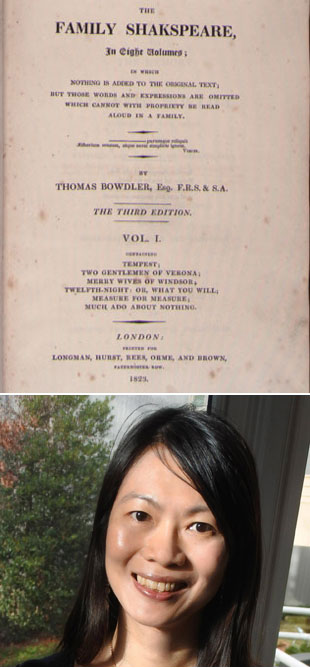
American academic Alexa Huang explores how Shakespeare’s plays were edited to make them more acceptable to Victorians.
Shakespeare has been used to divert around censorship, “sanitised” and redacted for children, young adults and school use, and even used as a form of protest all over the world. While censors have reacted differently to Shakespeare (sometimes with a blind eye), self-censorship (by directors and audiences) is part of the picture as well.
Not all censors work in the capacity of a public official. Many censors are in fact editors, writers and educators who are gatekeepers of specific forms of knowledge. Julius Caesar, for example, is often deemed one of the more appropriate plays to teach and perform in American school systems, because the themes of honor, free will and principles of the republic (as opposed to more sexually charged themes in other plays) are considered inspiring and suitable in the educational context.
The themes in such plays as Romeo and Juliet (teen exuberance and sex), The Merchant of Venice (anti-Semitism), Othello (racism and domestic violence), and Taming of the Shrew (sexism) make modern audiences uncomfortable, but they compel us to ask harder questions of our world.
While Shakespeare has been a large part of American cultural life, the “Shakespeare” that is taught and enacted in schools has often been redacted and even censored. But this is not a new phenomenon. The history of bowdlerized Shakespeare goes back to the nineteenth century. To bowdlerize a classic means to expurgate or abridge the narrative by omitting or modifying sections that are considered vulgar.
In fact, the term “bowdlerized” comes from Henrietta “Harriet” Bowdler who edited the popular, “family-friendly” anthology The Family Shakespeare (1807) which contains 24 edited plays. The anthology sanitised Shakespeare’s texts and rid them of undesirable elements such as references to Roman Catholicism, sex and more. The anthology was intended for young women readers.
Multiple ambiguities in Shakespeare are replaced by a more definitive interpretation. Ophelia no longer commits suicide in Hamlet. It is an accidental drowning. Lady Macbeth no longer curses “out, damned spot” but instead she says “Out, crimson spot!” Prostitutes are omitted, such as Doll Tearsheet in Henry IV Part 2. The “bawdy hand of the dial” (Mercutio) in Romeo and Juliet is revised as “the hand of the dial.”
Contrary to popular imagination, censorship is not a top-down operation. Instead, it is often a communal phenomenon involving both the censors and the receivers who willingly accept the Shakespeare that has been improved upon. Family Shakespeare was itself a family project. Thomas Bowdler (1754-1825) worked with his sister Henrietta Bowdler to bowdlerize or clean up the classics. The subtitle of the volume states that “nothing is added to the original text; but those words and expressions are omitted which cannot with propriety be read aloud in a family.” Shakespeare is credited as the author, though Bowdler made clear the Bard needed quite some heavy-handed editing.
Ironically, Henrietta Bowdler was herself censored. Thomas Bowdler’s name appears on the cover. It took two centuries for Henrietta to be credited for the anthology, for obviously there is no way she could have admitted that she recognised the bawdy puns in Shakespeare, much less editing them out of Shakespeare. The Bowdlers are among the better-known “censors” in the nineteenth century who editorialised the classics including Shakespeare.
When laying out her editorial principles in the preface, Bowdler does not hesitate to criticise the “bad taste of the age in which [Shakespeare] lived” and Shakespeare’s “unbridled fancy”:
The language is not always faultless. Many words and expressions occur which are of so indecent Nature as to render it highly desirable that they should be erased. But neither the vicious taste of the age nor the most brilliant effusions of wit can afford an excuse for profaneness or obscenity; and if these can be obliterated the transcendent genius of the poet would undoubtedly shine with more unclouded lustre.
She further explains her motive in The Times in 1819, emphasising that the “defects” in Shakespeare have to be corrected:
My great objects in the undertaking are to remove from the writings of Shakespeare some defects which diminish their value, and at the same time to present to the public an edition of his plays which the parent, the guardian and the instructor of youth may place without fear in the hands of his pupils, and from which the pupil may derive instruction as well as pleasure: and without incurring the danger of being hurt with any indelicacy of expression, may learn in the fate of Macbeth, that even a kingdom is dearly purchased, if virtue be the price of acquisition
While censorship carries a negative connotation in our times, The Family Shakespeare did broaden Shakespeare’s audience and readership. While American schools continue to redact Shakespeare, they also infuse Shakespeare into the American cultural life in various forms.
Alexa Huang will be participating in the Index on Censorship magazine panel at the Hay Festival.
[/vc_column_text][/vc_column][/vc_row][vc_row][vc_column][vc_custom_heading text=”From the Archives”][vc_row_inner][vc_column_inner width=”1/3″][vc_single_image image=”91322″ img_size=”213×289″ alignment=”center” onclick=”custom_link” link=”http://journals.sagepub.com/doi/pdf/10.1080/03064229008534812″][vc_custom_heading text=”Bowdler revisited: Shakespeare
” font_container=”tag:p|font_size:24|text_align:left” link=”url:http%3A%2F%2Fjournals.sagepub.com%2Fdoi%2Fpdf%2F10.1080%2F03064229008534812|||”][vc_column_text]March 1990
Artist Jane Zweig discovers books burned in Boston and looks at how Romeo and Juliet has been censored in America.[/vc_column_text][/vc_column_inner][vc_column_inner width=”1/3″][vc_single_image image=”94784″ img_size=”213×289″ alignment=”center” onclick=”custom_link” link=”http://journals.sagepub.com/doi/pdf/10.1080/03064227508532458″][vc_custom_heading text=”Censoring Shakespeare” font_container=”tag:p|font_size:24|text_align:left” link=”url:http%3A%2F%2Fjournals.sagepub.com%2Fdoi%2Fpdf%2F10.1080%2F03064227508532458|||”][vc_column_text]September 1975
A Lithuanian stage producer was dismissed from his post after sending an ‘open letter’ to Soviet authorities protesting censorship in theatre.[/vc_column_text][/vc_column_inner][vc_column_inner width=”1/3″][vc_single_image image=”93836″ img_size=”213×289″ alignment=”center” onclick=”custom_link” link=”http://journals.sagepub.com/doi/pdf/10.1080/03064228508533832″][vc_custom_heading text=”Clampdown on drama” font_container=”tag:p|font_size:24|text_align:left” link=”url:http%3A%2F%2Fjournals.sagepub.com%2Fdoi%2Fpdf%2F10.1080%2F03064228508533832|||”][vc_column_text]November 2007
Livingstone Njomo Waidhura reports on drama taught in schools and whether Shakespeare is a suitable hero for Kenya. [/vc_column_text][/vc_column_inner][/vc_row_inner][vc_separator][/vc_column][/vc_row][vc_row][vc_column width=”1/3″][vc_custom_heading text=”The unnamed” font_container=”tag:p|font_size:24|text_align:left” link=”url:%20https%3A%2F%2Fwww.indexoncensorship.org%2Fnewsite02may%2F2017%2F09%2Ffree-to-air%2F|||”][vc_column_text]The spring 2016 Index on Censorship magazine celebrates the 400th anniversary of William Shakespeare’s death, looking at how his plays have been used around the world to sneak past censors or take on the authorities – often without them realising. Our special report explores how different countries use different plays to tackle difficult themes.
With: Jan Fox, György Spiró, Martin Rowson[/vc_column_text][/vc_column][vc_column width=”1/3″][vc_single_image image=”86201″ img_size=”medium” alignment=”center” onclick=”custom_link” link=”https://www.indexoncensorship.org/newsite02may/2016/02/staging-shakespearean-dissent/”][/vc_column][vc_column width=”1/3″][vc_custom_heading text=”Subscribe” font_container=”tag:p|font_size:24|text_align:left” link=”url:https%3A%2F%2Fwww.indexoncensorship.org%2Fnewsite02may%2Fsubscribe%2F|||”][vc_column_text]In print, online. In your mailbox, on your iPad.
Subscription options from £18 or just £1.49 in the App Store for a digital issue.
Every subscriber helps support Index on Censorship’s projects around the world.
 SUBSCRIBE NOW[/vc_column_text][/vc_column][/vc_row]
SUBSCRIBE NOW[/vc_column_text][/vc_column][/vc_row]
02 Jun 16 | Mapping Media Freedom, News and features, Russia
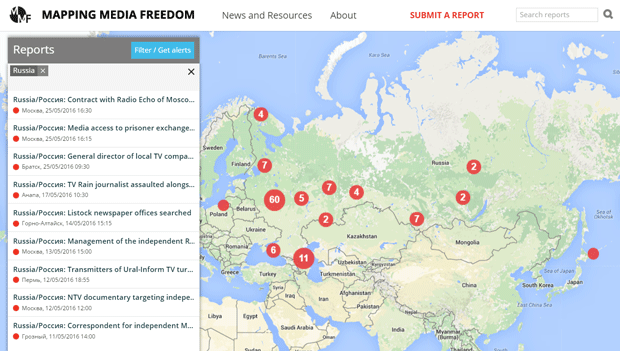
In Russia, business interests are protected by the state. When human rights violations or environmental damage are reported, nepotism and corrupt dealings between officials and business usually plays a large role. In these cases, no matter how serious the allegations or how strong the evidence, business owners skirt trouble while journalists and bloggers face real problems.
When copper and nickel ore deposits were discovered on the banks of the Khopyor River near a nature reserve in the Voronezhskaya oblast in 2012, the Ural Mining and Metallurgic Company (UGMK) was selected to exploit the deposits. Local residents and environmentalists protested when the company began prepping the site for extraction. Opponents were convinced that the development would cause environmental damage to the reserve and the river. Despite the objections, regional authorities granted UGMK permission to proceed with the project. In summer 2013 protests turned violent with clashes between the protesters and police and security hired by the company.
Research conducted by environmental activists and journalists uncovered alleged ties between UGMK’s owners, Iskander Makhmudov and Andrey Bokarev, and Kremlin-connected businessmen including Gennadi Timchenko and Vladimir Yakunin, close friends of the Russian president Vladimir Putin. The investigators also disclosed the involvement of several European companies.
Following the disclosures, two local activists, Mikhail Bezmensky and Igor Zhitenev, who published the information were accused of attempting to solicit a bribe from the company in order to halt the protests. Both were arrested and jailed. One more blogger, who faced threats, fled Russia and received political asylum in the EU.
Local mass media controlled by the department of property relations of the Voronezh region began spreading the allegation that a group of outsiders was trying to destabilise the situation. A Volgograd MP and businessman Oleg Pakholkov, sponsored by UGMK, launched Khozyaistvo Chernozyemya, a weekly newspaper with a circulation of about 60,000.
The paper routinely devoted five or six pages to laudatory coverage of nickel mining on the Khopyor, while the public protests were presented as a dirty competitive technique, an anti-state provocation, or a personal PR campaign of the protest activists. Other articles were about the positive experience of the Ural Mining and Metallurgic Company, the benefit of the project for the regional economy and its environmental safety.
Despite the ongoing protests mounted by opponents and periodic disclosures of corruption revealed by independent investigations UGMK continues to work on extracting the ore. The local activists still hope that Russia’s economic crisis, the collapse of commodity prices and their protests will help them stop the mining.
The UGMK investigations is just one example of the potential risks that journalists and bloggers face when they start publishing about Russia’s businesses.
In fact, a considerable part of the media rights violations in Russia reported to Mapping Media Freedom are against journalists who are prevented from reporting about corporations.
Officials and Putin-connected business owners who have been named in the Panama Papers leak have so far received full protection in the Kremlin-backed media while independent journalists and bloggers who reported on the disclosures have been accused of “undermining Russian interests for Western money” and face legal charges.
Aleksei Navalnyi, an opposition leader and the author of dozens of high-profile investigations into misconduct and corruption committed by state corporations has been charged three times since 2012 with crimes that he has not committed, including defamation and fraud.
The state has almost officially recognised that Navalnyi has been persecuted for his investigations. In 2013 Vladimir Markin, a spokesperson for Russia’s investigative committee, told the pro-Kremlin newspaper Izvestia that accusations against Navalnyi would not have been raised had the blogger not “teased power”.
In the last two months, three cases of journalists being targeted by corporate interests have been reported to Mapping Media Freedom.
On 12 April, while covering truckers who were protesting against the actions of transport company Omega, its director Evgeni Rutkovski attacked journalist Anton Siliverstov. When Siliverstov asked Rutkovski to comment on the protest, Rutkovsky forced Siliverstov from the office. The journalist said he would record the incident on his phone, at which point Rutkovski snatched the journalist’s device, refused to give it back and called security.
Two days later, reporter Igor Dovidovich was assaulted by the head of Gaz-Service, a gas company he was investigating. His TV crew was also attacked by the firm’s employees.
The month ended with state oil company Rosneft filing a judicial complaint against BiznessPress for an article which, the firm said, is “false and represents baseless fantasies of journalists or their so-called sources”.
Without support from news organisations or media laws to look to for protection, bloggers are often more vulnerable than journalists. While those reporting these crimes are often defenceless, those committing them often benefit.
01 Jun 16 | Campaigns, Campaigns -- Featured, mobile, Press Releases, What A Liberty!
 “What a Liberty!, based on passionate young voices, giving us the tools and freedom to express who we are and what we believe in. Sparking conversation. We’re here to influence the future. We’re here to promote a new charter. We are Magna Carta 2.0.”
“What a Liberty!, based on passionate young voices, giving us the tools and freedom to express who we are and what we believe in. Sparking conversation. We’re here to influence the future. We’re here to promote a new charter. We are Magna Carta 2.0.”
Brought together from all walks of life by What a Liberty!, and supported by a £36,200 grant from the Heritage Lottery Fund, the project is led by Index on Censorship with support from Bishopsgate Institute and C1 Media. Together, 18 young people explored and debated the concepts included in the original document before moving to create their Great Charter.
“What I’ve learned from being on the Magna Carta 2.0 is that everyone has a say. If a group of teenagers can come together and create this incredible project and speak their voices and make a change, then anyone can make a change,” Charlotte Gray, a What a Liberty! participant, said.
Magna Carta 2.0 aims to spark discussion, provoke change and encourage young people to make sure their voice is heard. The teens focused on the need for justice, education and environmental consciousness:
- Equal opportunities should be available for all, regardless of race, gender and class, in both the workplace and the educational system.
- Gender neutrality should be seen as equally important to gender equality.
- Freedom of speech shall be protected all around the world as one of the most valuable rights that people have.
- There shall be freedom for all to explore and express their sexuality and identity.
- Political education should be taught to all young people in secondary school in order to tackle disengagement and lack of political awareness.
- Educational opportunity should not be limited to a few – everyone must have an equal chance to succeed.
- Corporations must take more responsibility over their C02 emissions and pollution levels, and will convert to the use of green power with zero emissions targets in the near future.
“Magna Carta 2.0 is the culmination of a process during which What a Liberty! facilitators worked with the young people to research the foundations of the UK’s human rights by giving them access to Magna Carta in Lincoln and an amazing archive of material at the Bishopsgate Institute. They also met with experts from a variety of fields before deciding for themselves what the group wanted to include. On a personal level, I was consistently impressed by the diligence and ambition the young people applied to this project,” Helen Galliano, What a Liberty! project producer, said.
The What a Liberty! group has set out to inspire other young people to engage with politics and human rights by adding their voice to the Magna Carta 2.0. They’ve launched a self-managed website and social media presence (Twitter, Facebook, YouTube, Instagram) to spread the word and spark discussions about human rights in the 21st century. The site includes a Magna Carta 2.0 film, scripted and filmed by the young people collectively and features a spoken word poem that outlines the issues they feel passionate about, written by former Tottenham young poet laureate Janache John-Baptiste, a What a Liberty! participant.
On Wednesday 6 July the What a Liberty! team will hold a Magna Carta 2.0 kick off event hosted by the Collection Museum in Lincoln, a short walk from the original Magna Carta. The day will include a programme of workshops for local young people, a presentation, Q&A session, key-note speech and graduation ceremony for the group as they launch into the next phase of the project. The Lincoln launch will be an opportunity for the group to present their work in a professional environment, within a rich historical context.
To find out more about attending the event, please contact Helen Galliano on helen@indexoncensorship.org.
About Heritage Lottery Fund
Thanks to National Lottery players, we invest money to help people across the UK explore, enjoy and protect the heritage they care about – from the archaeology under our feet to the historic parks and buildings we love, from precious memories and collections to rare wildlife. www.hlf.org.uk @heritagelottery
About Index on Censorship
Index on Censorship is an international organisation that defends people’s freedom to express themselves without fear of harm or persecution. The inspiration of poet Stephen Spender, Index was founded in 1972 to publish the untold stories of dissidents behind the Iron Curtain. Today, we fight for free speech around the world, challenging censorship whenever and wherever it occurs. indexoncensorship.org @IndexCensorship
For further information, please contact
Index on Censorship: Helen Galliano, Project Producer, 02079637296 or helen@indexoncensorship.org
Heritage Lottery Fund: Felix Gott, Communications Manager, 02075916138 or felixg@hlf.org.uk
31 May 16 | About Index, Campaigns, Campaigns -- Featured, European Union, Statements
Index on Censorship condemned the agreement between the European Commission and tech firms Facebook, YouTube, Twitter and Microsoft to tackle hate speech online.
“Hate speech laws are already too broad and ambiguous in much of Europe,” said Index on Censorship chief executive Jodie Ginsberg. “This agreement fails to properly define what ‘illegal hate speech’ is and does not provide sufficient safeguards for freedom of expression.
“The agreement once again devolves power to unelected corporations to determine what amounts to hate speech and police it – a move that is guaranteed to stifle free speech in the mistaken belief this will make us all safer. It won’t. It will simply drive unpalatable ideas and opinions underground where they are harder to police – or to challenge.
“There have been precedents of content removal for unpopular or offensive viewpoints and this agreement risks amplifying the phenomenon of deleting controversial – yet legal – content via misuse or abuse of the notification processes.”


 Art has traditionally accompanied political and social movements in Latin America and the turn of the 21st century has seen a resurgence of diverse forms of expression, including hip hop.
Art has traditionally accompanied political and social movements in Latin America and the turn of the 21st century has seen a resurgence of diverse forms of expression, including hip hop.
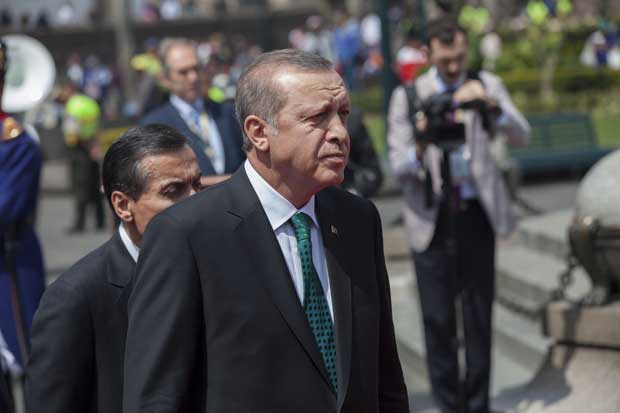









 “What a Liberty!, based on passionate young voices, giving us the tools and freedom to express who we are and what we believe in. Sparking conversation. We’re here to influence the future. We’re here to promote a new charter. We are Magna Carta 2.0.”
“What a Liberty!, based on passionate young voices, giving us the tools and freedom to express who we are and what we believe in. Sparking conversation. We’re here to influence the future. We’re here to promote a new charter. We are Magna Carta 2.0.”